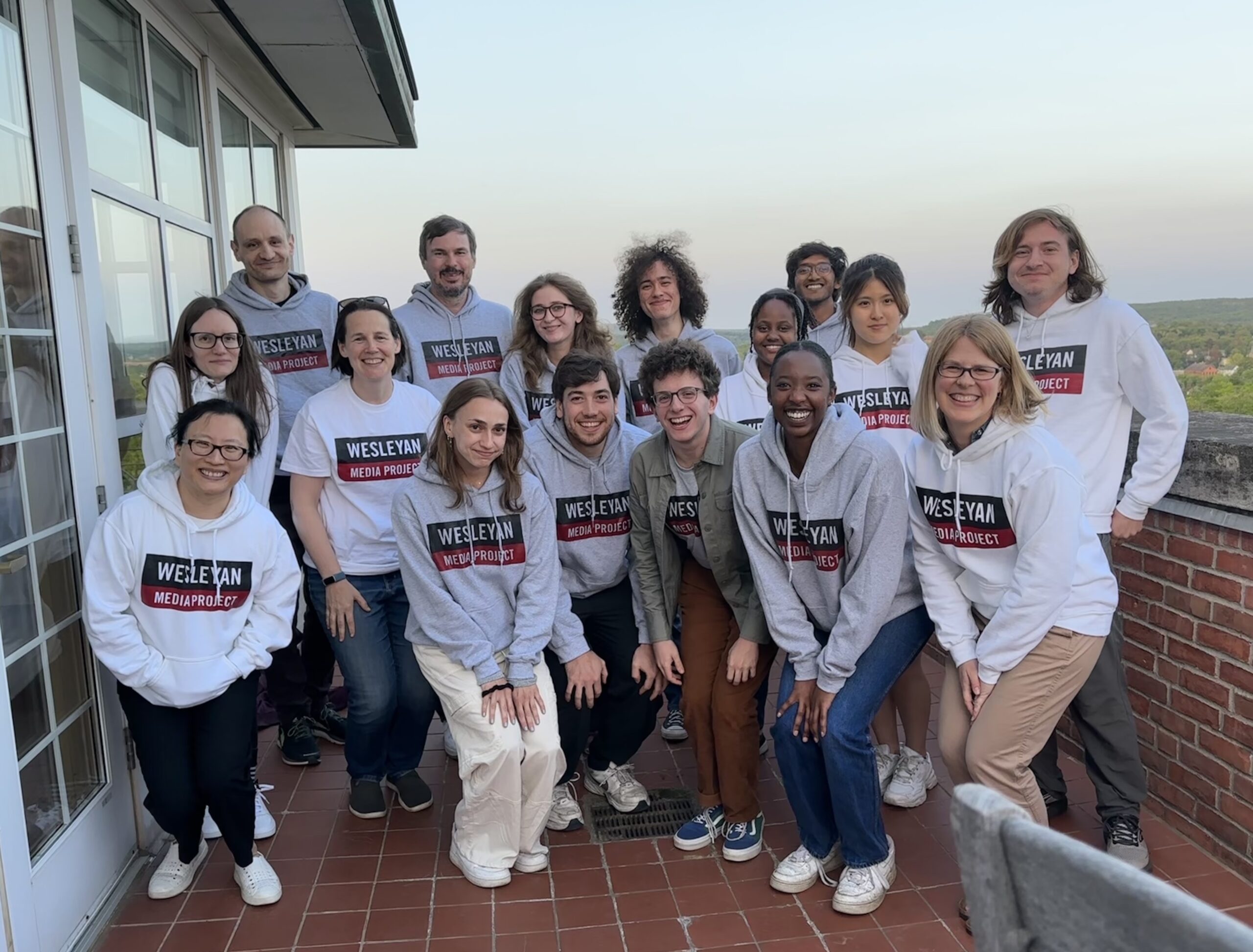
CURRENT LAB MEMBERS

Iris Chen – Class of 2026
Major: Psychology and Computer Science, Applied Data Science Certificate
Research interests: Machine Learning, Data Analysis, Psychology
Software Skills: RStudio, Stata, Excel
Programming Languages: Python, SQL, R, Stata, C

Rowan Cahill – Class of 2026
Majors: Government, Computer Science
Research Interests: Data Analysis, American Campaigns and Elections, Machine Learning
Software Skills: R, Stata, Python, C++, Excel

Julia Armeli – Class of 2025
Major and minor: Government and Data Analysis
Research Interests: Public opinion and survey analysis, quantitative policy analysis, machine learning
Software skills: Exploratory data analysis, statistical modeling, data visualization
Programming Languages: R, Stata

Hugo Harington – Class of 2025
Major and certificate: Government and Applied Data Science
Research interests: Machine learning applications for campaign messaging
Software skills: Data visualization, statistical analysis, machine learning methods
Programming languages: C, Python, R, SQL
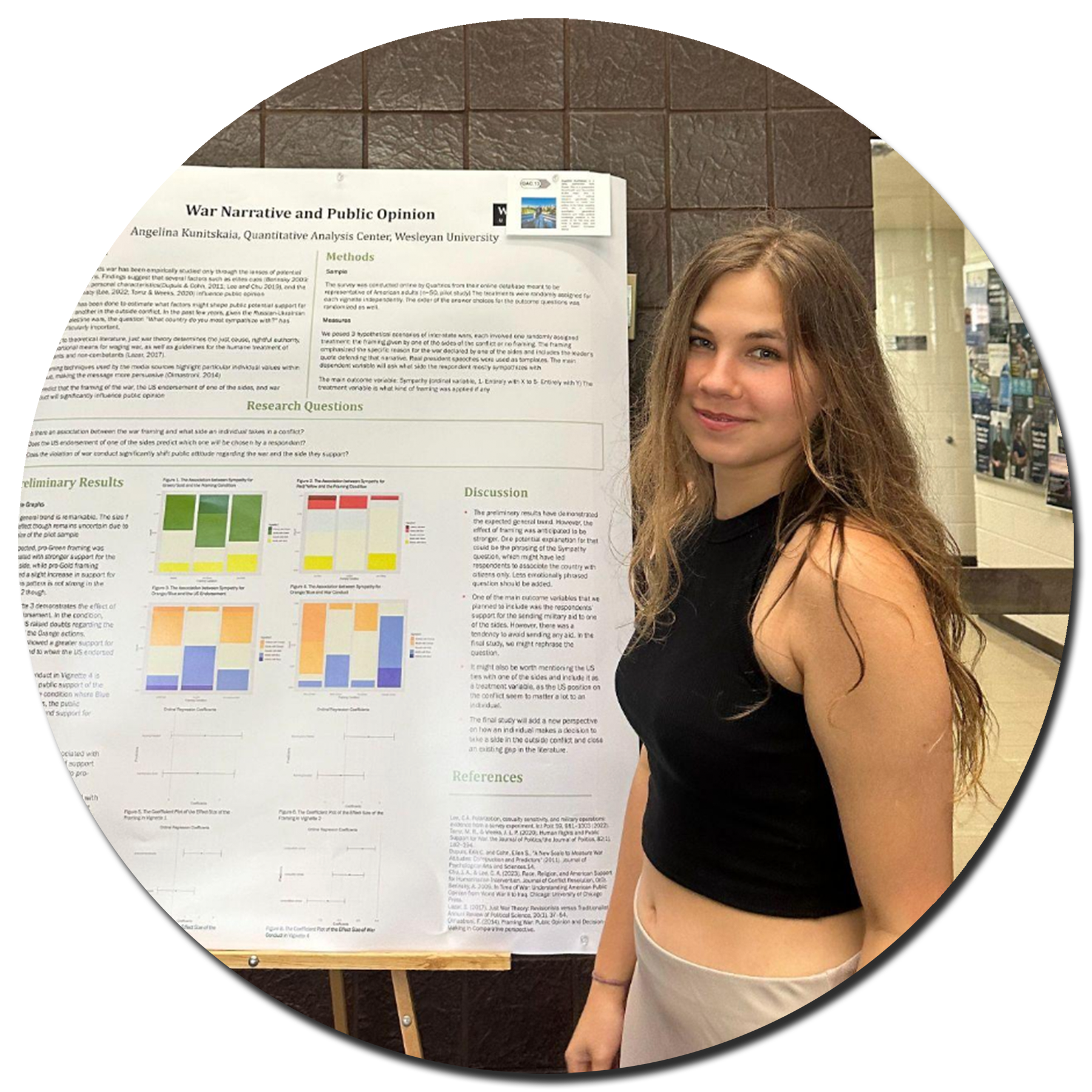
Angelina Kunitskaia – Class of 2027
Majors: Government, Economics
Research Interests: Public Opinion and Survey Analysis, Media, Political Campaigns
Software Skills: R, Stata, SAS

Gloria Cui – Class of 2025
Major: Economics and Sociology
Research Interests: Data Analysis, Media, Machine Learning
Software Skills: Stata, SAS, R
Programming Languages: Python

Nat Welsh – Class of 2025
Major and minor: Government
Research Interests: Campaign finance/dark money analysis, Misinformation detection/analysis
Software skills: Statistical analysis, Data visualization, Exploratory data analysis
Programming Languages: R, Python, SQL

Tara Pandey – Class of 2027
Major: Computer Science, Data Analysis Minor
Research Interests: Data analysis/visualization, Use of AI/LLMs, Public opinion, Big data, Mis/Disinformation
Software Skills: Adobe: Photoshop, InDesign, Microsoft Excel and VBA, Google Cloud Platform
Programming Languages: C, Java, JavaScript, MATLAB, Python (Pandas, Seaborn, NumPy)

Cornelia Carragher – Class of 2025
Major: Economics
Minor: Data Analysis
Research Interests: Data Analysis, Machine Learning
Software Skills:RStudio, Stata
Programming Languages: R, Python

Jack Trowbridge – Class of 2025
Majors: Government and East Asian Studies
Minor: Data Analysis
Research Interests: Race and Social Identity, Political Polarization, Outside Group Influence, and Local-Level Elections
Software Skills: Exploratory Data Analysis, Data Visualization
Programming Languages: R, SQL, Excel
AFFILIATED RESEARCHERS
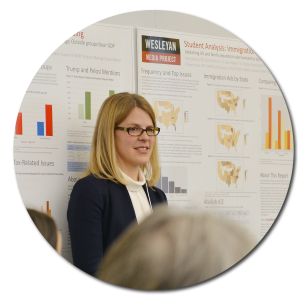
Erika Franklin Fowler, Professor of Government, Wesleyan University, Co-Director of the Wesleyan Media Project
Erika Franklin Fowler (Ph.D., University of Wisconsin – Madison) is Professor of Government at Wesleyan University where she directs the Wesleyan Media Project (WMP), which tracks and analyzes political advertising in real-time during elections. Fowler specializes in large-scale analyses of political communication – local media and campaign advertising in particular – in electoral and health policy settings, and her interdisciplinary work on the content and effect of messaging has been published in political science, communication, law/policy, and medical journals. She is also co-author of Political Advertising in the United States, and she has led WMP’s expansion into computational analyses of digital advertising.

Emmanuel Kaparakis, Director, Center for Advanced Computing and Quantitative Analysis Center, Wesleyan University
Manolis Kaparakis did his undergraduate work in Athens, Greece and his graduate work in Economics at the University of Connecticut. He is currently the Director of Centers for Advanced Computing at Wesleyan University, where he directs the Quantitative Analysis Center and oversees the development of the Scientific Computing and Informatics Center. Previously he was a member of the economics faculty at Providence College where he taught economics for twelve years, coordinated the development of the Quantitative Economics major and served as the Colleges Faculty Liaison for Information Technology.

Pavel Oleinikov, Associate Director, Quantitative Analysis Center, Wesleyan University
Pavel Oleinikov uses his background in social and natural sciences to advance the application of quantitative methods to data from the social world. He teaches courses on basics of Big Data, network analysis, text mining, and skills-focused courses. A large part of his work lies in assisting Wesleyan faculty in integrating diverse data sources in the form of text, images, and data from APIs. Pavel Oleinikov has a PhD in Political Science from University of California, Santa Barbara. His dissertation focused on paradigms of impatience and their quantitative investigation. For his MS thesis in computer engineering he studied applications of Hopfield-type neural networks to optimization tasks.

Breeze Floyd, Program Manager of the Wesleyan Media Project
Breeze Floyd joined the Wesleyan Media Project in April 2022 as Research Coordinator and is now the Program Manager. Based at Wesleyan University, Breeze manages WMP’s student research assistants who content code television advertisements and news content. She holds a BA from Wesleyan University.

Yujin Kim, Postdoctoral Fellow in Computational Social Science, Quantitative Analysis Center and Wesleyan Media Project, Wesleyan University
Yujin’s research focuses on political communication, media effects, and computational methods, analyzing political discourse across media platforms. Her work aims to address democratic challenges such as political polarization. She received her Ph.D. in Communication Studies from the University of Texas at Austin in 2022.

Meiqing Zhang, Postdoctoral Fellow in Computational Social Science, Quantitative Analysis Center and Wesleyan Media Project, Wesleyan University
Meiqing’s research examines the evolution of political values and attitudes in relation to ideological, cognitive and affective polarization.

Markus Neumann, Postdoctoral Fellow in Computational Social Science, Quantitative Analysis Center and Wesleyan Media Project, Wesleyan University
Markus Neumann’s research agenda revolves around the application of machine learning methods to social science data, particularly text, audio and images. He holds Bachelor and Masters degrees from the University of Mannheim and completed his graduate work in Social Data Analytics and Political Science at Penn State. His dissertation relies on tools from phonetics, electrical engineering and natural language processing to study nonverbal political communication, focusing on how U.S. senators shift their vocal style in accordance with the representational needs of their audience.

Michael Franz, Professor of Government and Legal Studies, Bowdoin College, Co-Director of the Wesleyan Media Project
Michael Franz (Ph.D., University of Wisconsin – Madison) is Professor of Government and Legal Studies at Bowdoin College in Brunswick, ME. His research interests include campaign finance, political advertising, and interest groups. He is author or co-author of four books, including The Persuasive Power of Campaign Advertising (Temple, 2011) and Choices and Changes: Interest Groups in the Electoral Process (Temple, 2008). He has published articles in such journals as, the Journal of Politics, American Journal of Political Science, American Politics Research, and Political Communication. Since 2010, he has been co-director of the Wesleyan Media Project, which tracks and codes political ads in federal elections.

Travis Ridout, Professor of Government and Public Policy, Washington State University, Co-Director of the Wesleyan Media Project
Travis N. Ridout is Thomas S. Foley Distinguished Professor of Government and Public Policy in the School of Politics, Philosophy and Public Affairs at Washington State University. He is one of the country’s leading authorities on the topic of political advertising and serves as codirector of the Wesleyan Media Project, which studies and tracks political advertising. From 2014-2016, he served as chair of the Political Communication section of the American Political Science Association. Ridout received his Ph.D. in political science from the University of Wisconsin-Madison in 2003, and his research on political campaigns, political advertising and campaign finance has appeared in the American Journal of Political Science, British Journal of Political Science, Journal of Politics, Political Communication, Political Behavior, Political Psychology, Annual Review of Political Science, and in several books and book chapters. Ridout’s most recent book, Political Advertising in the United States, was published in 2016.
ALUMNI

Jielu Yao, Postdoctoral Fellow in Computational Social Science, Quantitative Analysis Center and Wesleyan Media Project, Wesleyan University
Jielu’s research interests center on political methodology and American politics. Particularly, she is interested in applying supervised, unsupervised, and deep learning techniques to non-traditional data such as text, image/video, and audio. Using WMP’s political ads, her dissertation examines crime rhetoric adopted by female and racial/ethnic minority candidates. Jielu received her Ph.D. from the University of Iowa in Political Science in 2020.

Matt D’Annunzio – Class of 2024
Major: Government, Data Analysis Minor
Research Interests: Data Analysis, Network Analysis
Software Skills: R, Python, SPSS

Bryan Do, Class of 2024
Major: Economics and Computer Science
Research interest: Data Analysis, Machine Learning, Natural Language Processing
Software skills: Python, R, Stata

Minji Woo – Class of 2026
Major: Economics and Computer Science
Research Interests: Data Analysis / Visualization, Natural Language Processing, Machine Learning, Business Applications of Data
Software Skills: RStudio, Stata, Web Development
Programming Languages: Python, R, C, Javascript

Drew Olsen, Class of 2024
Major: Economics
Certificate: Applied Data Science
Research Interests: Political Applications of Data, Media and Communications, Natural Language Processing
Software Skills: RStudio, Excel, NLP, Data Analysis
Programming Languages: Python, R, Stata
Drew joined Delta Lab in Fall 2022 and is currently looking at how ad spends change in relation to election day. Their academic interests are how text data can be used in media analysis, especially in the field of political science, as well as how major political events affect tone in political communications.

Furkan Cakmak, Postdoctoral Fellow in Computational Social Science, Quantitative Analysis Center and Wesleyan Media Project, Wesleyan University
Furkan’s research interests are political psychology and political communication within the American political context. His dissertation focuses on the relationship between media choice and affective polarization and the role of emotions within that relation. His other research agenda centers around using supervised machine learning models to measure polarization among political elites using text data. Furkan received his Ph.D. in Political Science from Washington State University in 2023.

Sam Feuer, Class of 2023
Major: Computer Science and Mathematics
Research Interests: Network Analysis, Natural Language Processing, Machine Learning
Software Skills: Web Development, RStudio, Exploratory Data Analysis
Programming Languages: Python, R, Javascript, HTML/CSS
Sam joined the Delta Lab in January 2020. Since then, he has worked on many projects, including: analyzing the ways that candidates discuss racial justice ads in the presidential election, examining the use of Spanish language advertising in the election, and creating machine learning algorithms to automate the handcoding of Facebook ads. He is particularly interested in the applications of networks to the field of political science.
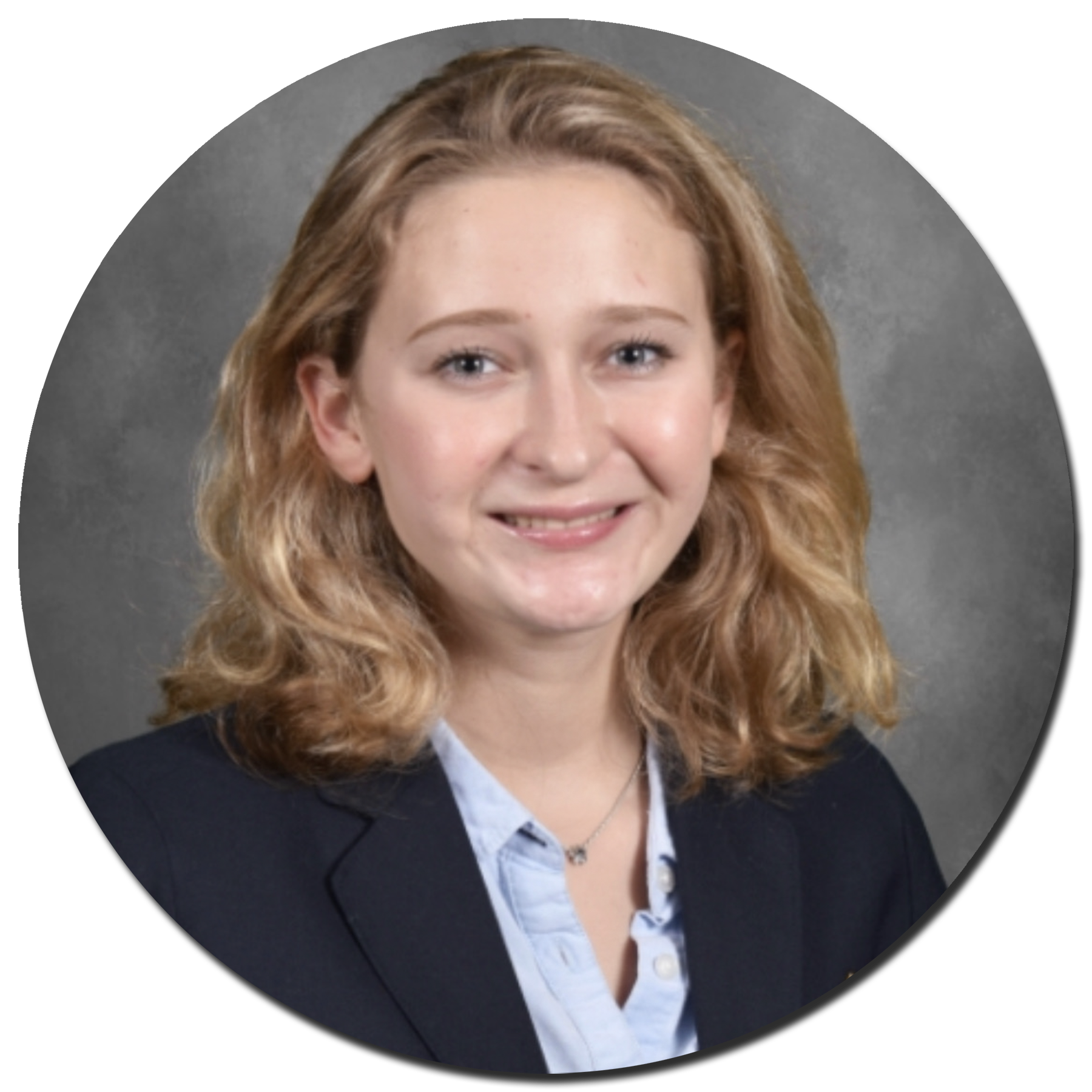
Efi Miller – Class of 2025
Major: Government and History double major
Research Interests: Data Analysis, political trends over time, public policy, and public opinion
Software Skills: R, Excel

Latonya Smith, Class of 2024
Major: Computer Science
Research Interests: Psychology, Neuroscience, Social Media, Artificial Intelligence
Programming Languages: C, Python

Emma Tuhabonye, Class of 2023
Major: Computer Science, Data Analysis Minor
Research Interests: Natural Language Processing, Machine Learning, Deep Learning
Software Skills: Data Manipulation and Visualization, RStudio, PowerBI, DataStudio
Programming Languages: R, Python, Stata, SQL
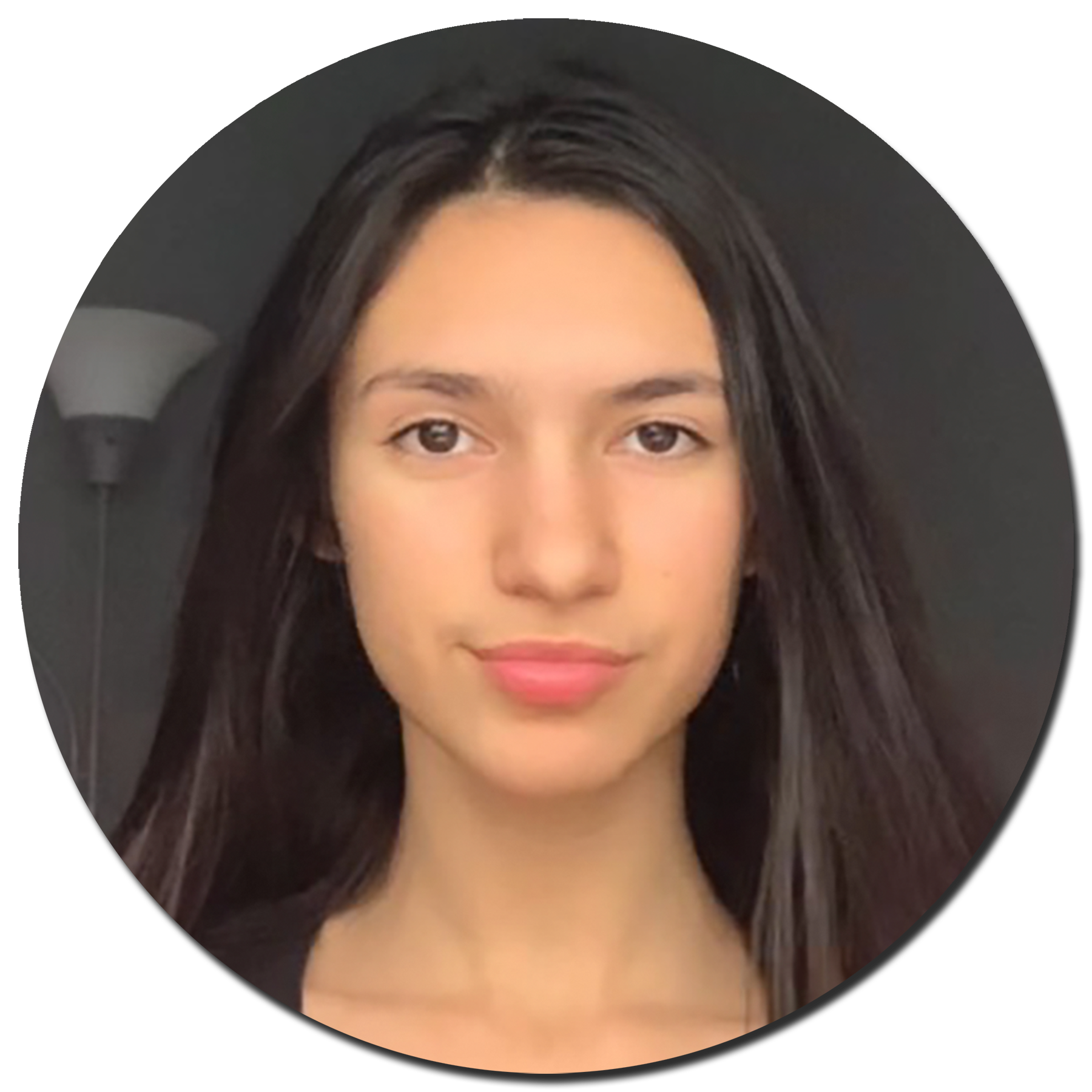
Jasmine Sanchez – Class of 2026
Major: Psychology and Government
Research Interests: Public Policy and Data Analysis
Programming Languages/Software Skills: R, Excel

Natalie Appel, Class of 2023
Major: Economics
Research Interests: Data analysis/visualizations, news and media, and political polarization
Software Skills: Python, SQL, Stata, C, R and Rstudio data manipulations and visualizations
LinkedIn Profile

Oliver Diamond, Class of 2023
Major: Computer Science with Certificate in Applied Data Science
Research Interests: Computer Vision, Natural Language Understanding, Computational Neuroscience
Software Skills: Data Analysis, Stata, Excel
Programming Languages: Python, R, C++
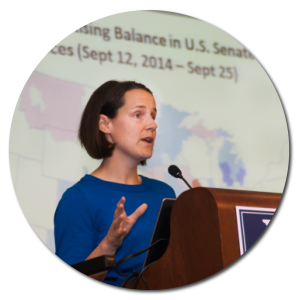
Laura Baum, Associate Director, Wesleyan Media Project, Wesleyan University
Laura Baum joined the Wesleyan Media Project in September 2012 as Project Manager and is now an Associate Director. Based at Wesleyan University, Laura manages ongoing operations of the project’s real-time tracking of television advertisements. She grew up in Portland, OR and holds a BA from Brown University and a Master of Urban and Regional Planning from the University of Minnesota.
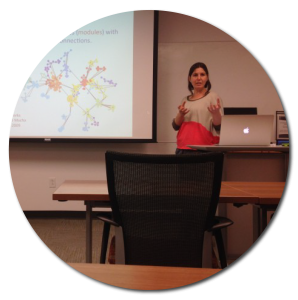
Saray Shai, Assistant Professor of Computer Science, Wesleyan University
Saray Shai’s research interests include networks, complex systems and data science. In particular, she is interested in analyzing complex systems, such as human cells in the body and individuals in our society, by describing which components interact with one another. Shai’s goal is to develop mathematical and computational tools and apply them to data analysis problems arising in a variety of contexts.

Jem Shin, Class of 2023
Major: Economics and English
Minor: Data Analysis
Research Interests: Public policy, political polarization, machine learning
Software Skills: RStudio, Data Analysis
Programming Languages: R, Stata, Python

Trey Plante, Class of 2024
Major: Computer Science and Applied Data Science
Research Interests: Networks, Machine Learning, and Artificial Intelligence
Software Skills: Back-end Development, Data Analysis
Programming Languages: Python, SML, C, SQL
LinkedIn Profile
Github Profile
Trey joined Delta Lab in the Fall of 2021. His main project focused on applying networks to analyze the political relationships revealed through ads and using computer vision to analyze ad content.

Lexie Silverman, Class of 2023
Major: Computer Science and Economics
Minor: IDEAS
Research Interests: Bias, Political Decision-Making, Data Analysis & Visualizations, Computer Vision
Programming Languages: Python, R, SML, Java
LinkedIn Profile
Lexie joined Delta Lab in June 2021. She worked primarily with political Facebook ads from the 2020 U.S. election. Her academic interests include applied cognitive science and behavioral studies, which she incorporated into her research by analyzing bias and political decision-making. She enjoyed collaborating with both the computer vision and network analysis teams, and helped to provide well-labeled data as well as data analysis.

Roshaan Siddiqui, Class of 2022
Major: Computer Science
Research Interests: Security & Privacy, Virtual Reality
Software Skills: Angular & Ionic Framework, Xcode, & Unity3D
Programming Languages: JavaScript, C#, Python, & Swift
LinkedIn Profile
Personal Website
Github Profile
Roshaan created a web application for the Wesleyan Media Project using the Angular Framework (JavaScript, HTML, and CSS). The web application presents WMP’s human coders with a visual way of “marking” the news video clips. This tool streamlines the process of human coding and provides WMP accurate markers to refer back to video clips.

Noah Cohen, Class of 2022
Major: Government and Economics
Research Interests: Network analysis, political transparency, big data, food security, criminal justice
Software Skills: R Studio, Social media analysis, data visualization
Programming Languages: Stata, R, Python
LinkedIn Profile

Ori Cantwell, Class of 2022
Major: Psychology and Data Science Certificate
Research Interests: Network Analysis, Disinformation Studies, Internet Studies
Software Skills: Tableau, Adobe Suite
Programming Languages: R, SAS, Python, Stata
LinkedIn Profile
Portfolio Website
Ori joined Delta Lab in 2021. He worked on network analysis of public health-related campaign advertising. His previous research at Georgetown University explored COVID-19 anxiety, information sharing behaviors, and partisanship.

Dale Ross, Class of 2022
Major: Computer Science and Government with a Data Analysis Minor
Research Interests: Public Opinion, Political Decision-making, Machine Learning, Artificial Intelligence
Software Skills: Rstudio, Excel, Unity, Data Visualization
Programming Languages: Python, C#, R, SAS
LinkedIn Profile

Brianna Mebane, Class of 2022
Major: English & Computer Science
Research Interests: Software design, social media trend analysis & social applications.
Programming Languages: Python, SML, R
Brianna joined Delta Lab in June 2020. She worked on projects pertaining to textural similarity and keyword searching in political Facebook ads, with a focus on racial content and bias related to Asian Americans on coronavirus and Black Lives Matter.

Julia Crainic, Class of 2023
Major: Economics and Government
Research Interests: Political polarization, data visualization
Software Skills: RStudio, data manipulation and visualization
Programming Languages: R, Python, Stata
LinkedIn Profile
Julia joined the Delta Lab in 2021. Her work illustrated the ways in which candidates mention members from both their own and the opposing political party in their political advertising. This analysis helps to explain the role of political parties in elections and how candidates run both for their party and against the opposing party.

Magda Kisielińska, Class of 2022
Major: Mathematics, Computer Science, Government
Research Interests: Machine Learning, Political Polarization
Software Skills: RStudio, Exploratory Data Analysis, Network Analysis
Programming Languages: R, Python
LinkedIn Profile

Abdallah Salia, Class of 2022
Major: Computer Science/ Physics
Research Interests: Artificial Intelligence, Machine learning, Computational Physics, Big Data
Software Skills: Database Management, Front-End Development
Programming Languages: Python, JavaScript, Java
LinkedIn Profile
Abdallah worked on DELTA Lab’s face recognition pipeline to help improve video and image analysis. The aim was to analyze different parts of the existing pipeline and assess the performance relative to alternative neural network models to improve the model as a whole. He also explored the possibility of using OpenCV object tracking techniques in video analysis to enhance face prediction accuracy in videos.

Adam Linsky, Class of 2020
Adam worked on developing a topic classifier for Facebook political ads by combining text and audio data, building a machine learning approach to coding advertisements similar to the human coders working for the Wesleyan Media Project. The goal of the project was to develop an automated process for coding Facebook political advertisements that reached the accuracy standard of human coders, saving hundreds of hours spent hand-coding ads.

Satida (Amy) Limtrajiti, Class of 2023
Major: Studio Art with Minors in IDEAS and Data Analysis
Research Interests: Public Opinion, Social Media, Security & Privacy
Software Skills: Data Manipulation and Visualization, Adobe Creative Cloud, Figma, World of Warcraft
Programming Languages: Stata, Python, HTML, CSS
LinkedIn Profile
Amy joined the DELTA Lab in 2020. She worked on analyzing dark money, political advertisements, and astroturfing campaigns. She is interested in pursuing future research related to public opinion particularly via social media and also topics relating to data security & privacy.

Angela Loyola, Class of 2021
Major: Government
Research Interests: Politics and Gender Issues
Software Skills: R Studio, Data Visualization, Social Media Analysis, Excel
Programming Languages: Python, R
LinkedIn Profile
Angela joined Delta Lab in the Spring of 2020. Her initial work included analysis of political advertising related to the COVID-19 pandemic. She also analyzed Spanish-language advertising on Facebook and worked on a project with D3.js to visually represent analyses of political advertising on Facebook and Google.

Adina Gitomer, Class of 2020
Major: Computer Science
Research Interests: Networked socio-technical processes
Software Skills: Gephi, Jupyter Notebook, LaTeX, Adobe Photoshop; also very good at Googling things
Programming Languages: Python, ML, C
Adina analyzed dark money spending (i.e. latent ties between funding entities) within the vast collection of Facebook advertisements. She constructed various network structures out of the data to perform network analyses over them in order to uncover the hidden connections.

Conner Sexton, Class of 2020
Major: Anthropology
Research Interests: Criminal Justice, Politics, People
Software Skills: Machine Learning, Text Analysis, Minecraft
Programming Languages: R, SQL, Stata, SAS, Python
LinkedIn Profile
Conner worked on both the coding and computational sides of the Wesleyan Media Project and the Delta Lab for two years. He’s used SQL and R to query and summarize political spending to investigate how presidential candidates and third party entities targeted different candidates through Facebook advertisements. The goal of this work is to provide more transparency to the digital advertising landscape in the context of the 2020 general elections. More broadly, Conner’s work focused on providing deliverable exploratory tools to better understand how money is spent and how candidates are mentioned in political advertising online.

Daniel Knopf, Class of 2022
Major: Computer Science/English
Research Interests: Government and Political Ads
Software Skills: Webscraping, Data Analysis
Programming Languages: Python, SML, R, SQL
LinkedIn Profile
Daniel has been working with the political ad data from Google in order to acquire the creatives of the ads listed in its transparency report. He’s been using a python web scraper he built to scrape the text ad creatives from Google’s dynamic ad display webpage, which has allowed him to acquire a csv of the text ad creatives. As an extension of this project, Daniel is working with Google Cloud Functions as well as Python Flask to create an automated program that will download the text and video creatives from the weekly Google ad transparency report.

Duong Vu, Class of 2018
Duong worked on a classification model for political TV transcripts based on text similarity accompanied by a website that allowed researchers to interact with and filter through the results.

Elizaveta Kravchenko, Class of 2019
As an undergrad, Elizaveta researched various visualization strategies to strike a balance between efficient and effective presentation of WMP data. Utilizing softwares like VegaLite and D3, she developed an interface combining geographic and political ad data in an interactive graphic with the aim of making lab research more accessible to non lab members. She also served as a course assistant in Professor Franklin Fowler’s Media Analysis Fall 2018 course.

Frederick Corpuz, Class of 2020
Major: Computer Science
Research Interests: Facial recognition, object tracking in video data.
Software Skills: web scraping, text mining, image analysis, dashboard creation.
Programming Languages: Python, R, SQL
LinkedIn Profile
Fred developed wmp-face – a Python package to reduce time and cost of campaign ad research – capable of scraping image and video content from Google and Facebook ads and recognize people of interest in images and videos. He also created a text similarity algorithm to detect misspelled, rearranged and omitted words based on the Latent Dirichlet allocation topic modeling to find duplicates within transcripts from broadcast television news.

Kevin McMorrow, Class of 2020
Major: Art History
Research Interests: Data visualization, social media, political polarization
Software Skills: RStudio, Adobe Creative Cloud, World of Warcraft
Programming Languages: R, JavaScript, Python
Kevin focused on political spending, in particular, presidential candidate spending. He used a combination of R, D3.js, and SQL to visualize spending activity—paying special attention to the interactivity, legibility, and updatability of these graphics. The guiding questions behind most of these visualizations include: How can we elegantly visualize candidate spending behavior over the course of several months? What is the best form for these visualizations to take? What sort of interactive features do we want to provide the viewer with? The answers to these questions are always changing, but that’s what keeps work with the DELTA Lab so engaging!
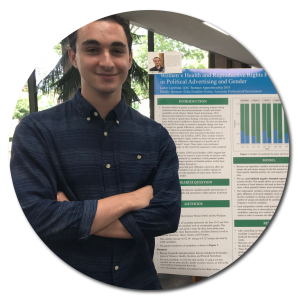
Lance Lepelstat, Class of 2020
Major: Economics
Research Interests: Gender in Politics, Health Care Policy
Software Skills: Data Visualization
Programming Languages: Stata, R, SPSS, SAS, Python, C, MATLAB
Lance worked on a study of gender differences in campaigning, focusing on candidates’ references to Donald Trump, themselves, and their opponents. Using data generated from automated textual and visual analyses of Facebook campaign advertising, he explored the relationship between gender and partisanship in guiding advertising decisions for Senate candidates in 2018.
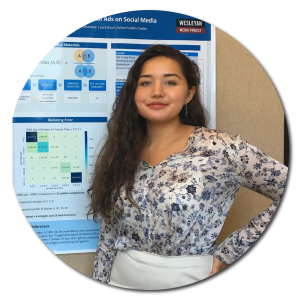
Elizaveta Atalig, Class of 2021
Major: Computer Science
Research Interests: Text similarity algorithms, political ad transparency on social media, and data analysis.
Software Skills: Locality Sensitive Hashing algorithms and web development.
Programming Languages: Python, C, Javascript, HTML, CSS, Java
LinkedIn Profile
Liz worked with Professor Saray Shai to explore interest group spending derived from the Facebook Ad Library. She focused on finding similarities in ad text to discover interesting connections between funders. To accomplish this goal for large datasets, she implemented a Locality Sensitive Hashing algorithm that estimated similarities in ad text more efficiently than direct comparisons.

Natchanok (“Pim”) Wandee, Class of 2023
Major: Economics and College of Social Studies
Research Interests: Politics, Global Issues, Social Media, News
Software Skills: Data Visualization, Social Media Analysis, Modelling, DOTA2
Programming Languages: R, SQL
LinkedIn Profile
Pim joined the DELTA Lab in the spring of 2020 and worked with metadeta from political advertisements on Facebook to analyze information on average spending and individual references across the 2020 Presidential and Senate candidates. This analysis provided insight into the behavior of political advertising on social media. Pim also worked on analysis and visualizations of COVID-19 media coverage.
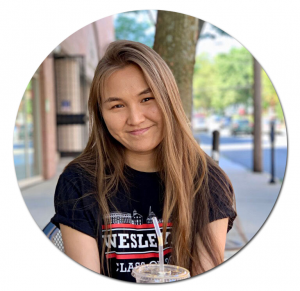
Naraa Altai, Class of 2022
Major: Computer Science
Research Interests: Data Visualization, Machine learning
Software Skills: Adobe Illustrator/Photoshop, C4D
Programming Languages: C, Python, R

Ransho Ueno, Class of 2023
Major: Government and Science in Society Program
Research Interests: Health policy, Social Determinants of Health, Health equity
Software Skills: R Studio, Time-series Analysis, Data manipulations and visualizations
Programming Languages: R, Python
Ransho joined Delta Lab in 2020 and analyzed how political ads on social media and dark money affected the result of health policies in the 2020 presidential election.

Spencer Dean, Class of 2021
Major: Psychology
Research Interests: Natural Language Processing, Network Analysis
Software Skills: Tableau, Cytoscape, Excel
Programming Languages: R, Python, SQL
LinkedIn Profile
Spencer joined the Wesleyan Media Project in the spring of 2019 and worked to provide insights primarily regarding 2020 presidential candidate activity on Facebook. His past research focused on a variety of topics including coverage of COVID-19, the imagery of face masks in advertisements, and A/B tests run by Trump and other candidates on Facebook. He provided data visualizations for WMP press releases and Delta Lab blog posts.

Tsun Lok Kwan, Class of 2021
Tsun worked on extracting, clustering and visualizing near-duplicate tokenized news stories from massive corpora obtained from Sinclair-owned television stations. Locality-sensitive hashing algorithms were used for collision-maximizing approximate nearest neighbor search to drastically reduce search space. The Smith-Waterman algorithm was adapted from protein sequencing to assess text similarity for NLP. LDA topic modelling was used to probabilistically derive unobserved groupings to cluster tokenized news broadcasts. t-SNE dimensionality reduction was used to compute the optimal embedding of high dimensional vectorized text in low dimensional space to accurately visualize topic clusters and finally wavelet image hashing and image histograms were used to efficiently extract and classify political advertisements

Courtney Page-Tan, Postdoctoral Fellow in Computational Social Science, Quantitative Analysis Center and Wesleyan Media Project, Wesleyan University
Courtney leverages her background in hyperlocal local social ties, public policy, urban and social resilience, GIS, social network analysis, and international relations to explain how urban planners and individuals can build resilience by proactively making investments into their online and offline social ties to mitigate negative outcomes of unexpected shocks and disturbances.

DELTA Lab is supported by The Wesleyan Media Project and The Quantitative Analysis Center.


